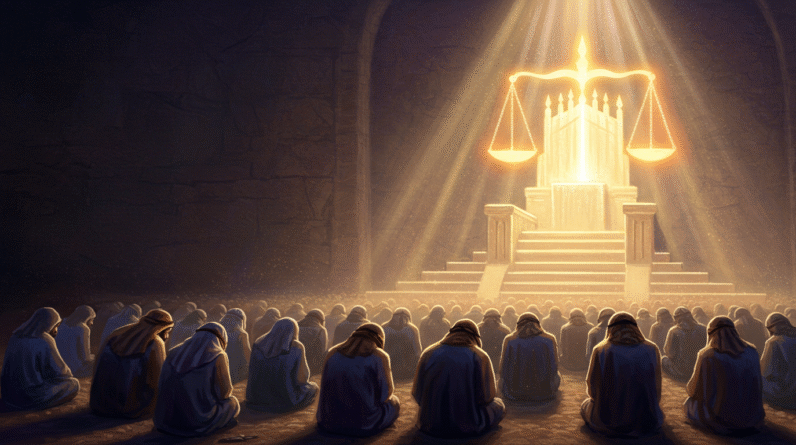God’s Covenant Love (Exodus 34:6)
When you come to the heart of Scripture, you will find a moment that stops you in your tracks. On Mount Sinai, after Israel had broken the covenant by fashioning a golden calf, Moses stood before God pleading for mercy. In response, God revealed Himself in a way that would shape the faith of His people for generations. You read the moment in Exodus 34:6: Exodus 34:6. There you see God not as a distant judge only, but as a covenant God whose very name is wrapped in compassion and steadfast love. In this article, you will walk through that revelation — its language, its covenant context, its expression in Jesus Christ, and what it means for how you live and worship. I want to help you hold together God’s mercy and His justice, because both are essential to who He is and how you relate to Him.
The Moment on Mount Sinai: A Revelation after Rebellion
When you read the story of the golden calf and the broken covenant, it’s easy to focus on Israel’s failure. Yet the context of Exodus 34:6 is a deeper drama: Moses intercedes for a rebellious people, and God responds by passing before him and proclaiming His name. You can look at that moment as a covenant renewal. Even after sin, God moves toward restoration. See the scene for yourself at Exodus 34:6. In that response, God’s character is not merely described; it is proclaimed — set down as the basis of the renewed relationship. That proclamation becomes a cornerstone for your understanding that God’s actions toward His people are rooted in His gracious nature, not in caprice.
The Language of Covenant Love
When you study Exodus 34:6 closely, you discover a string of words that together paint a portrait of God. Each of these words tells you something vital about how God relates to sinners and how He fulfills His promises.
“The LORD, the LORD”
The repetition — “The LORD, the LORD” — is weighty. You will notice it echoes the revelation of God’s personal, covenantal name. It tells you that what follows is not a casual description but a self-revelation from the One who has made promises and keeps them. The name grounds everything that comes next: mercy, grace, patience, love, and faithfulness. That means when you approach God, you approach the One who is committed to a covenantal relationship, not a neutral cosmic force.
“Compassionate and Gracious”
The Hebrew words translated as “compassionate” and “gracious” emphasize God’s tender, active care for those who are weak and in need. You see the same sentiment echoed throughout the Psalms and prophets. For example, Psalm 103:8 says, “The LORD is compassionate and gracious, slow to anger, abounding in love.” This isn’t a distant sympathy; it’s a posture of tenderness toward broken people. When you sin, God’s heart is moved to respond with mercy, not merely with detached judgment. That does not nullify justice, but it colors how justice is administered: with a desire to restore.
“Slow to Anger”
You will be relieved and surprised by the phrase “slow to anger.” God’s anger is real — Scripture speaks plainly about it — but here you see that His anger is not His default setting. Instead of eruptive, vindictive fury, God displays patient restraint. This patience gives you room to repent. The prophets call God to relent when the people turn back to Him; Joel instructs Israel to rend their hearts and return because the Lord is compassionate and abounding in love and is willing to relent: Joel 2:13. God’s slowness to anger gives you time and invitation to come home.
“Abounding in Love and Faithfulness”
The words translated “love” and “faithfulness” point to a deep, covenantal commitment. In Hebrew, the word often behind “love” is hesed — a loyalty that endures, a steadfast love that refuses to let go. You see this theme throughout Scripture, where God’s steadfast love proves stronger than human failure. Psalm 136:1 echoes this refrain: “Give thanks to the LORD, for he is good. His love endures forever.” Faithfulness (often rendered “truth” or “reliability”) means that God’s promises are as sure as His character. When you stand in the brokenness of life, you can rely on God’s loyalty to His promises.

Covenant Context: Why These Words Matter for Promise Keeping
When you read Exodus 34:6 in its covenant context, you cannot separate God’s character from His commitments. The God who proclaims himself compassionate and faithful has sworn to be a God to Abraham, Isaac, and Jacob. That promise is not a casual pledge; it is a covenant — a binding commitment that shapes Israel’s identity and mission. Deuteronomy reminds you that God keeps His covenant of love to a thousand generations when the people obey Him: Deuteronomy 7:9. God’s mercy is not weak; it is covenantal, and therefore it acts consistently to preserve the promise He made. For you, this means God’s love is not fickle; it is tied to a faithful God who acts according to His promises.
The Other Half of the Picture: God’s Justice
While you appreciate God’s compassion, you must also reckon with another truth that is right there in the bookend of Exodus 34:6 — the passage continues into verse 7, which speaks of God “maintaining love to thousands, and forgiving wickedness, rebellion and sin. Yet he does not leave the guilty unpunished.” You can read it at Exodus 34:7. That balance — mercy and justice — is not a contradiction but the very nature of God. His love does not abolish holiness; it honors it. Scripture consistently affirms that God’s throne is upheld by righteousness and justice. You see this truth in the Psalms: “Righteousness and justice are the foundation of your throne” Psalm 89:14. Likewise, the prophets demand justice for the oppressed: “Let justice roll on like a river, righteousness like a never-failing stream!” Amos 5:24. God’s love seeks restoration, but restoration must be built on the right dealing with sin and evil.
How God’s Love and Justice Meet in the Gospel
When you come to the New Testament, you discover that God’s mercy and His justice find their resolution in Jesus Christ. The cross is where God’s holiness and His love intersect. Paul explains that God presented Christ as a sacrifice of atonement, so that He might be just and the one who justifies those who have faith in Jesus: Romans 3:25-26. In Christ, God does not sweep sin under the carpet; He deals with it fully and, at the same time, offers mercy to the sinner.
You also find the gospel’s personal word to you: “But God demonstrates his own love for us in this: While we were still sinners, Christ died for us” Romans 5:8. That love does not nullify justice — it satisfies it. In Christ, God’s faithfulness to His covenant is manifest, and His righteousness is honored because sin’s penalty is borne by the Son. The result is both forgiveness and righteousness offered to you when you believe.
Jesus as the Embodiment of Covenant Love
If you want to see Exodus 34:6 lived out in human flesh, look to Jesus. In Him you find perfect compassion, perfect grace, and perfect faithfulness. The apostle John captures this when he writes, “This is love: not that we loved God, but that he loved us and sent his Son as an atoning sacrifice for our sins” 1 John 4:10. Jesus, who was moved with compassion for the crowds, who healed the sick, forgave the sinful, and welcomed the outcast, is the living portrait of the God who proclaimed Himself on Sinai. Hebrews tells you that Jesus was tempted in every way but was without sin, so He can sympathize with your weakness and be a merciful and faithful high priest: Hebrews 4:15. When you come to Jesus, you do not come to an abstract moral philosophy; you come to the faithful God who keeps His covenant by giving Himself for you.
The Tension Made Practical: How You Live in the Light of Both
Acknowledging God’s covenant love and His justice should change how you think, pray, and act. There are several dimensions where the balance of mercy and righteousness should shape your life.
For Your Assurance
When you wrestle with doubt about your acceptance before God, remember that His covenantal love is steadfast. Scripture invites you to trust the faithfulness of God’s promises. “The LORD is compassionate and gracious” is not just comforting poetry; it is a foundation for your hope. You may also be comforted by reminders like Psalm 86:15, which echoes the Sinai proclamation. God’s love endures even when you fail. That doesn’t excuse complacency, but it does assure you that repentance finds a willing and merciful God.
For Your Repentance
God’s patience gives you time to return. The slowness to anger is an invitation. Joel calls the people to return with all their hearts because God is compassionate and gracious Joel 2:13. When you recognize your sin, don’t harden your heart. Confession is not merely a ritual; it is your response to a God whose faithfulness is greater than your unfaithfulness. That confession leads to a renewed relationship and renewed fruitfulness.
For Your Worship
Worship flows from knowing the God who is both merciful and just. When you worship, you honor His holiness and thank Him for His love. The Psalms model this balance: they cry out against sin, plead for justice, and also sing of God’s lovingkindness — “For his steadfast love endures forever” Psalm 136:1. Your worship should be shaped by awe and gratitude, trembling and joy.
For Your Relationships
If you belong to a God who is merciful yet just, you must model mercy tempered by truth in your relationships. Jesus taught you to forgive because you have been forgiven, yet He also called people to repentance. Mercy without truth can become enabling; truth without mercy becomes judgmental. Micah’s call captures the balance you should pursue: “What does the LORD require of you? Act justly and to love mercy and to walk humbly with your God” Micah 6:8. Your daily decisions should show both compassion for the weak and a commitment to righteousness.
For Your Service and Justice
The God who delights in steadfast love also calls you to justice in the world. Amos reminds you that God cares about righteous institutions and cares for the oppressed Amos 5:24. Your faith should fuel social concern — feeding the hungry, defending the widow and orphan, and stewarding the created order — all done out of love that reflects God’s heart. At the same time, your efforts should be honorable and faithful; you pursue justice as a reflection of God’s rule.
Stories from Scripture: Mercy and Justice in Tension
Scripture is full of narratives that portray God’s justice and compassion working together — sometimes in ways that will surprise you.
In the story of Jonah, you see God’s compassion toward a repentant Nineveh, even as Jonah struggles with God’s mercy. The prophet’s anger at God’s grace toward sinners reveals how your expectations of justice can clash with God’s mercy. The Lord’s action demonstrates that His love is not limited by national boundaries.
In the tragedy of the flood, God’s justice responds to pervasive wickedness, yet He preserves a remnant through Noah, establishing a covenant sign in the rainbow. The judge of the earth can bring judgment, but He also remembers mercy and promises renewal.
When you look at the cross, you find the ultimate resolution of tension: the righteous Judge bears the penalty for sin, and the merciful God provides the way of salvation. You read that now as the heart of the gospel, where justice and love meet perfectly in Christ.
How to Study Exodus 34:6 Yourself
You can make Exodus 34:6 a living part of your daily faith by studying it with a few simple steps. Start by reading the verse in several translations to see how the words are rendered. Compare the NIV reading in Exodus 34:6 with other versions to grasp nuances. Reflect on each descriptor — compassion, grace, slowness to anger, steadfast love, faithfulness — and look up parallel verses that echo these attributes, such as Psalm 103:8 and Micah 7:18. Ask how each attribute deepens your trust, stirs repentance, or motivates service. Finally, pray that God will make His character known to you not only as information but as transformation.
Questions for Personal Reflection and Group Discussion
You will grow when you wrestle with the implications of God’s covenant love. Here are questions to help you reflect or discuss in a small group:
- When have you experienced God’s compassion in a way that left you speechless? How did that moment shape your faith?
- How do you reconcile God’s patience with His eventual judgments? What does that teach you about divine timing?
- In what ways are you invited to mirror God’s mercy and justice in your relationships, workplace, or community?
- How does the cross inform your understanding of Exodus 34:6? Where do you see God’s justice honored in the gospel?
- What practical step will you take this week to live out “loving mercy” and “doing justice” in your context?
Take these questions seriously. Discuss them with others. Let God’s truth reshape how you think and act.
Practical Steps to Live Out Covenant Love
You don’t need complicated programs to live as someone shaped by God’s covenant love. Start with small, faithful steps that reflect both mercy and justice.
Pray regularly for a heart like God’s — one that grieves sin but longs for restoration. Confess sin honestly, knowing that God is faithful and will forgive [1 John 1:9 — see the NIV text at Bible Gateway: https://www.biblegateway.com/passage/?search=1+John+1:9&version=NIV]. Seek reconciliation where you have wronged others, and offer forgiveness where you have been wronged.
Engage in acts of mercy: visit the lonely, feed the hungry, give time and resources to those in need. At the same time, support efforts that promote justice — fair wages, defense of the voiceless, and ethical stewardship of resources. Let your life be a visible picture of the God who loves and is just.
Assurance for the Weary: God’s Faithfulness Endures
You will be tempted to believe that your failures disqualify you from God’s love. The Scripture that Moses heard on Sinai should change that fear. God’s “love and faithfulness” are not temporary feelings; they are enduring commitments. Lamentations testifies to this steadfastness even in sorrow: “Because of the LORD’s great love we are not consumed, for his compassions never fail. They are new every morning” Lamentations 3:22-23. That promise is for you today. When you repent and turn to God, you meet the One who keeps covenant.
The Evangelistic Urgency of Covenant Love
Knowing God’s covenant love compels you to tell others. If God has moved toward you with costly mercy, you must help others see that same mercy. The gospel is the unfolding of God’s covenant faithfulness, most clearly revealed in Christ. John 3:16 captures the urgency and simplicity of that message: “For God so loved the world that he gave his one and only Son…” John 3:16. You are entrusted with the powerful message that God’s love reaches sinners — and that His justice has been satisfied in the cross. Share it gently and boldly.
Final Exhortation: Respond to the God Who Is Both Merciful and Just
As you close this study, remember that the mercy you enjoy was costly. God’s justice demanded satisfaction; His love provided the satisfaction in Christ. That balance should move you to worship, repentance, and mission. The God who declared Himself on Sinai as “compassionate and gracious, slow to anger, abounding in love and faithfulness” Exodus 34:6 is the God who meets you in your need. Come to Him with humility, confess your dependence, and trust the work of Christ for your salvation.
If you have not yet responded to that invitation, consider this a gentle call. The Scriptures are clear: God’s heart is for sinners who return. The gospel is both urgent and gracious — urgent because time is short, gracious because God waits with open arms. Romans puts it plainly: “God presented Christ as a sacrifice of atonement, through the shedding of his blood — to be received by faith” Romans 3:25-26. If you will believe, you will find both forgiveness and new life.
Closing Prayer and Invitation
Lord, make the words of Exodus 34:6 real to your people. Give you a heart that understands both Your holiness and Your mercy. Repent where you must, rely wholly on Jesus, and go out to love and serve in His name. Let the balance of mercy and justice fill your life so that others might see and know the God who keeps covenant.
If this article stirred something in you, I encourage you to take a simple step: apply one practical item from this study today. Pray, confess, reach out to someone in need, or share the gospel with a neighbor. Let God’s covenant love be the engine of your life.
Explore More
For further reading and encouragement, check out these posts:
👉 7 Bible Verses About Faith in Hard Times
👉 Job’s Faith: What We Can Learn From His Trials
👉 How To Trust God When Everything Falls Apart
👉 Why God Allows Suffering – A Biblical Perspective
👉 Faith Over Fear: How To Stand Strong In Uncertain Seasons
👉 How To Encourage Someone Struggling With Their Faith
👉 5 Prayers for Strength When You’re Feeling Weak

📘 Jesus and the Woman Caught in Adultery – Grace and Mercy Over Judgement
A powerful retelling of John 8:1-11. This book brings to life the depth of forgiveness, mercy, and God’s unwavering love.
👉 Check it now on Amazon
As a ClickBank & Amazon Affiliate, I earn from qualifying purchases.
Acknowledgment: All Bible verses referenced in this article were accessed via Bible Gateway (or Bible Hub).
“Want to explore more? Check out our latest post on Why Jesus? and discover the life-changing truth of the Gospel!”








